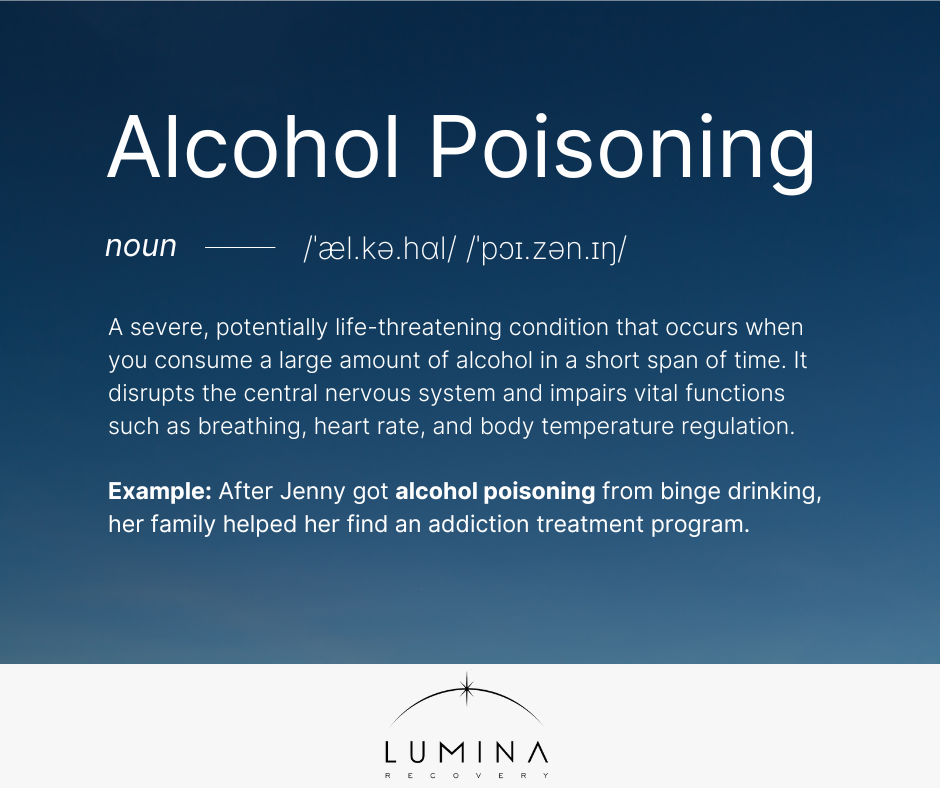Alcohol poisoning is a severe, potentially life-threatening condition that occurs when you consume a large amount of alcohol in a short span of time. It disrupts the central nervous system and impairs vital functions such as breathing, heart rate, and body temperature regulation.
Recognizing the early signs can make all the difference, as prompt action may save a life. Whether you drink alcohol or care for someone who does, understanding how alcohol poisoning happens and knowing how to respond is essential.

The Science Behind Alcohol Poisoning
When you drink alcohol, it affects your central nervous system and slows down brain functions. The blood alcohol concentration (BAC) measures the percentage of alcohol in your blood. As the BAC rises, it increases the risk of alcohol poisoning and impairs vital functions.
Even after initial consumption, the stomach and intestines continue to absorb alcohol, further elevating the BAC and potentially overwhelming the liver. This disruption can compromise life support functions, making it critical to monitor signs like changes in body temperature and heart rate.
Causes and Risk Factors
One of the primary causes of alcohol poisoning is binge drinking. When you engage in binge drinking, you consume a large amount of alcohol in a short period. Drinking on an empty stomach can worsen the situation because it allows alcohol to be absorbed more rapidly, which increases the risk of alcohol poisoning.
This is a common issue among teens and college-age individuals who drink alcohol irresponsibly and may not yet understand the impact of their choices.
Not everyone is affected by alcohol in the same way. Factors such as body weight, metabolism, and tolerance play a role in how your body processes alcohol. Mixing alcohol with other substances can also overwhelm your system, making it essential to understand your limits and avoid behaviors that can lead to dangerous outcomes.
Signs and Symptoms of Alcohol Poisoning
Recognizing the signs of alcohol poisoning early can be life-saving. Look out for these symptoms:
Early Indicators
- Confusion: The person may seem disoriented or unable to think clearly.
- Vomiting: Repeated vomiting can signal that the body is trying to expel too much alcohol.
- Impaired Coordination: Difficulty walking or maintaining balance is a common sign.
Severe Manifestations
- Seizures: Uncontrolled convulsions may occur.
- Slow or Irregular Breathing: Breathing can become shallow or erratic, which directly affects the heart rate.
- Loss of Consciousness: An unconscious person is one of the most alarming symptoms of alcohol poisoning.
- Reduced Gag Reflex: A compromised gag reflex increases the risk of choking, so it is crucial to monitor if the person is at risk of aspirating vomit.
- Abnormal Body Temperature: A drop in body temperature can be dangerous and indicates that the body is failing to regulate itself.
Immediate Response and First Aid
If you suspect someone has alcohol poisoning, swift action is essential. Follow these steps:
Emergency Actions
- Call 911. If you see any severe symptoms such as an irregular heart rate, loss of consciousness, or a compromised gag reflex, call 911 Quick action can prevent further complications.
- Stay with the person. Remain with the individual at all times to monitor their condition. If the person becomes unconscious, it is vital that someone stays to check on them.
- Position to prevent choking. To prevent choking, gently roll the person onto their side. This position helps keep the airway clear in case their gag reflex is weak.
- Keep them warm. Ensure that the person’s body temperature is maintained while waiting for emergency services.
What to Avoid
- Do not induce vomiting. Trying to force the person to vomit can worsen the situation. The process of vomiting might lead to choking, especially if their gag reflex is not working correctly.
- Avoid cold showers or excessive cooling. Although it might seem like a way to counteract high body temperature, using cold showers or other methods of rapid cooling can be harmful.
Quick, calm, and proper first aid is vital when dealing with alcohol poisoning.

Avoiding Alcohol Poisoning and Overcoming Addiction
If you or a loved one is struggling with alcohol addiction, seeking help is a vital step toward a healthier future. Immediate medical attention is crucial when severe symptoms occur, allowing you to stabilize your condition and avoid alcohol poisoning. Once the acute phase is managed, long-term recovery focuses on addressing the underlying addiction.
A range of evidence-based treatments exists, including medically supervised detox programs, residential or outpatient care, and therapies such as cognitive behavioral therapy (CBT), dialectical behavior therapy (DBT), and medication-assisted treatment (MAT). These approaches help manage triggers, develop healthy coping strategies, and reduce the risk of relapse.
Recovery is a personal journey influenced by early intervention, a supportive network, and professional guidance. Taking that first step to seek help can transform your life and set you on the path to lasting wellness.
FAQs
What are the first signs of alcohol poisoning?
Early symptoms include confusion, vomiting, seizures, slow or irregular breathing, and loss of consciousness.
How does alcohol poisoning differ from being drunk?
Intoxication may impair judgment and coordination, but alcohol poisoning is a medical emergency that compromises vital life support functions and can lead to severe complications.
Can alcohol poisoning be treated at home?
No, alcohol poisoning requires professional medical treatment. Attempting to treat it at home, especially by trying to induce vomiting or cool the person rapidly, can be very dangerous.
How long does it take to recover from alcohol poisoning?
Recovery time varies based on the amount of alcohol consumed and individual health factors. Hospitalization may be necessary for continuous monitoring and treatment.
Is alcohol poisoning common among first-time drinkers?
First-time drinkers, including teens and college-age individuals, are at higher risk because they often have lower tolerance levels and may not understand safe drinking practices.
Your Path to Recovery Starts Now With Lumina Recovery
Understanding alcohol poisoning, including its causes, symptoms, life-saving first aid steps, and recognizing early signs, is vital for timely intervention.
At Lumina Recovery, our comprehensive partial hospitalization program (PHP) and telehealth services are designed to support you from crisis management to long-term recovery, helping you avoid alcohol poisoning and regain control of your life.
Contact Lumina Recovery today for the guidance and support you need on your journey to a healthier life.


